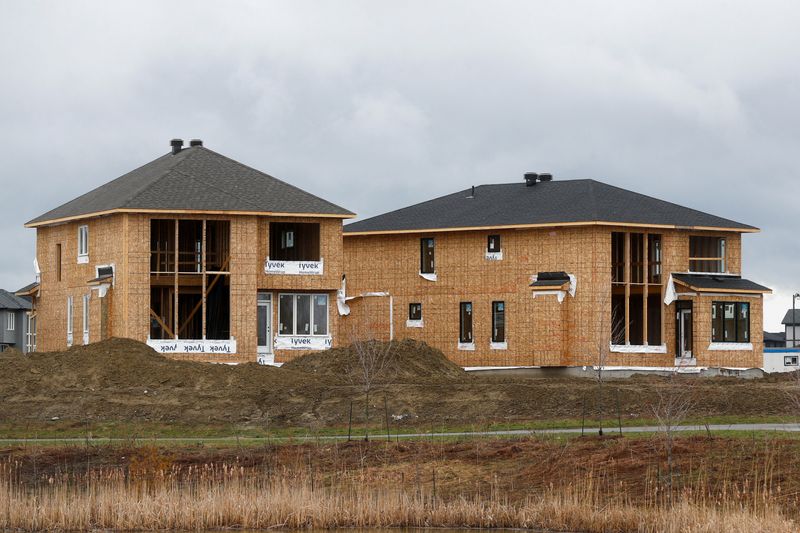(Reuters) - Canada on Sunday announced a two-year extension to a ban on foreign ownership of Canadian housing, saying the step was aimed at addressing worries about Canadians being priced out of housing markets in cities and towns across the country.
Canada is facing a housing affordability crisis, which has been blamed on an increase in migrants and international students, fueling demand for homes just as rising costs have slowed construction.
Foreign ownership is a bit of a blind, you need to ban corporate ownership as well
Well you see we can’t do that because the lawmakers are the ones in charge of those corporations
I don’t like paying property taxes on my 150 single family rental properties. Perhaps I should go into politics to change policies allowing me to profit more on denying people the ability to purchase property, since people like me bought all of the supply.
quite so, quite so, however this ban on foreign ownership has put them them in quite the pickle as they can no longer blame dirty foreigners. And with people starting to cotton on to the “immigrants and international students” tactic I look forward to the uptick in articles on “african gangs” (or the canadian equivalent) to angry up the blood.
How do you define ‘corporate’ ownership? If you can own 100 properties as an individual, does that count as ‘corporate’? If it doesn’t, that seems like an easy loophole. If the intent is to ban large quantities of homes owned by single entities, then doing it by quantity sounds more sensible.
That might redistribute old homes, but it doesn’t necessarily solve the drip feeding of new homes that we have going on right now. For example, the UK used to build 250k+ houses every year during the 1950-1980s period. 50% of that was government built council houses for those in need. It’s estimated that we need to build 250k more homes than we currently do in the UK, and the private housing industry has not done its part.
Why you acting like we can only do one of these things?
-
ban company/ corporate ownership of standalone housing.
-
increased scale of taxation on any property past PPR. One house gets you 10% increase. Two gets you 20%, etc. oh it’s empty? Now you got an empty property tax as well
-
fuck up developer scarcity. Set hard time limits between land purchase and development / sale. Give land use laws teeth
Why you acting like we can only do one of these things?
I’m not, please don’t assume that. It sounds like we’re in agreement here, so I’m not debating you, but rather adding to your post, I suppose. It sounded like you wanted to extend the conversation towards solutions to the housing crisis in general.
all g I realised that came across a bit more antagonistic than intended. I meant it more as “let’s do ALL of it mwahhahaa”
Why you acting like we can only do one of these things?
Because it’s a common tactic used to confuse an issue and get the discussion bogged down in irrelevant details and “hah! Gotcha!” moments.
…Yeah i’d read the rest of the thread before throwing that around
-
How do you define ‘corporate’ ownership? If you can own 100 properties as an individual, does that count as ‘corporate’?
It’s how you report the income. A corporation pays corporate tax rate on profit. An individual pays income tax. If someone wants to pay the individual income tax on 100 properties, that’s awesome. 33% over 250k. Corporate tax rate can easily be half of that.
Plus filing your taxes is waaaaaay easier having a corp hold all the assets and generating revenue, and the individual as an employee who draws a salary. If you’re just an individual with 100 properties and you get audited, you’re in for a bumpy ride trying to pick apart personal vs rental purchases
Has there been any data on whether the approach is working?
Assuming price is driven by supply and demand this definitively would reduce demand (unless foreigners are not buying), another thing that should also be done is to ban corporations from purchasing homes.
My bigger question is why haven’t construction companies been able to pick up the slack. Anyone working in that field should be making a killing right now
AFAIU contribution companies are already working to capacity. Canada has a significant shortage of skilled trades, so that’s a limiting factor.
Another factor (that politicians have been much more vocal about) is the planning process that construction companies have to comply with when building new developments or infill.
EDIT: and the relatively high interest rate makes it hard to get financing.
It’s my understanding as little as a year ago raw materials were also still suffering a shortage, though I’m not sure that’s the case now.
Yep I’m sure that was the theory. Was just curious if anyone had been checking on how it’s going in practice.
This is the official answer :
Personally speaking I don’t think it’s suppose impact prices much. In fact they were so concerned about it they started adding in exemptions almost right afterwards.
In itself there is a lot of Canadian wealth tied to housing so unless there’s some magical situation where affordability happens in a vacuum people will fight hard to against any policy that hits their wallets. My proof for this is that in 2021 when we had a election 80% of people decided that having the two parties that brought us through decades of housing costs going up was who they wanted to run the country.
Looks like the house on arrested development lmao.
It’s only light treason, Michael. How bad can it be?






